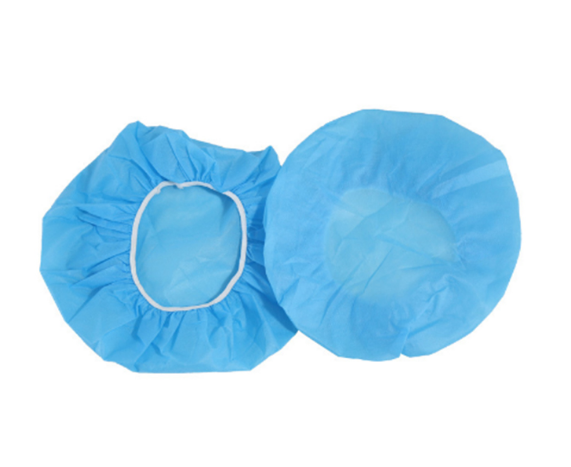Surgical caps, also known as scrub caps or bouffant caps, are a standard part of the attire worn by healthcare professionals in surgical and clinical settings. These caps serve multiple essential purposes, including infection control, hygiene maintenance, and safety compliance. In this comprehensive guide, we will delve into the purpose and significance of surgical caps in healthcare.
-
Infection Control
Barrier Protection:
One of the primary purposes of surgical caps is to act as a barrier, preventing the shedding of hair and microorganisms from the scalp and facial hair of healthcare professionals. These caps are designed to cover the entire head, including the hairline, to minimize the risk of contamination during surgical procedures and patient care.
Reducing the Risk of Surgical Site Infections (SSIs):
Surgical site infections (SSIs) are a significant concern in healthcare settings, as they can lead to complications for patients and increased healthcare costs. Hair and microorganisms from healthcare workers’ heads and facial hair can be a source of contamination in the sterile field. Surgical caps play a crucial role in reducing the risk of SSIs by preventing hair and skin particles from entering the surgical site.
-
Maintaining Sterility
Preserving the Sterile Field:
In surgical procedures, maintaining a sterile field is paramount to ensure the safety of patients. Surgical caps, along with other sterile attire such as gowns and gloves, help healthcare professionals adhere to strict aseptic techniques. By covering the head and hair, surgical caps contribute to preserving the sterile environment in the operating room.
Preventing Airborne Contamination:
Hair can trap particles and microorganisms from the environment, including dust and pathogens. Surgical caps serve as a physical barrier to prevent healthcare professionals’ hair from releasing contaminants into the air, further safeguarding the sterile field.
-
Hygiene and Professionalism
Patient Perception:
Surgical caps also have a psychological impact on patients. They convey a sense of professionalism and commitment to hygiene, which can help reassure patients and build trust in the healthcare team. Patients often associate the wearing of surgical caps with expertise and a focus on their well-being.
Clean Appearance:
Surgical caps are part of the overall attire that healthcare professionals wear in clinical and surgical settings. They contribute to a clean and uniform appearance, reflecting the commitment to hygiene and patient safety. This uniformity helps create a sense of order and professionalism in healthcare environments.
-
Safety and Compliance
Compliance with Regulations:
Surgical caps are often required by healthcare facility policies and regulatory agencies, such as the Centers for Disease Control and Prevention (CDC) and the Occupational Safety and Health Administration (OSHA). Compliance with these regulations is essential to ensure patient and healthcare worker safety.
Protection for Healthcare Professionals:
In addition to protecting patients, surgical caps offer some benefits to healthcare professionals themselves. They help keep hair out of the eyes and face during procedures, which can be particularly important when working with sharp instruments or when maintaining a clear line of vision is crucial.
-
Preventing Cross-Contamination
Minimizing the Spread of Microorganisms:
Surgical nurse caps play a role in preventing cross-contamination in healthcare settings. They help healthcare professionals avoid direct contact between their hair and patients, surfaces, or medical equipment. This reduces the risk of transferring microorganisms from one source to another.
Maintaining a Controlled Environment:
In environments where control over contaminants is critical, such as in pharmaceutical manufacturing or biotechnology research, surgical caps are used to prevent contamination of products, samples, or sensitive equipment.
-
Comfort and Convenience
Comfortable Fit:
Surgical caps are designed to be comfortable for healthcare professionals to wear for extended periods. They typically have adjustable features, such as elastic bands or ties, to ensure a secure yet comfortable fit.
Sweat Absorption:
During long surgical procedures or when working in warm environments, healthcare professionals may perspire. Surgical caps often incorporate sweat-absorbing materials to help keep the forehead dry and maintain comfort.
-
Style and Personalization
Identification and Differentiation:
In busy healthcare environments, surgical caps can serve as a means of identifying different healthcare roles. Some facilities use color-coded caps to distinguish between surgical team members, such as surgeons, nurses, and anesthesiologists.
Personalization:
While maintaining hygiene and professionalism is paramount, some healthcare professionals choose to personalize their surgical caps with patterns or designs. This allows them to express their individuality while adhering to safety and hygiene standards.
Conclusion
Disposable surgical caps are a vital component of healthcare attire, serving multiple essential purposes in clinical and surgical settings. They contribute to infection control, hygiene maintenance, and safety compliance, while also conveying professionalism and patient reassurance. By preventing hair and microorganisms from entering sterile fields, surgical caps play a critical role in ensuring patient safety and the success of medical procedures. Their use is not only a regulatory requirement but also a symbol of commitment to patient care and safety in healthcare settings.



